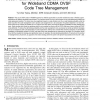Free Online Productivity Tools
i2Speak
i2Symbol
i2OCR
iTex2Img
iWeb2Print
iWeb2Shot
i2Type
iPdf2Split
iPdf2Merge
i2Bopomofo
i2Arabic
i2Style
i2Image
i2PDF
iLatex2Rtf
Sci2ools
114
click to vote
TMC
2002
2002
Code Placement and Replacement Strategies for Wideband CDMA OVSF Code Tree Management
The use of OVSF codes in WCDMA systems has offered opportunities to provide variable data rates to flexibly support applications with different bandwidth requirements. Two important issues in such an environment are the code placement problem and code replacement problem. The former may have significant impact on code utilization and, thus, code blocking probability, while the latter may affect the code reassignment cost if dynamic code assignment is to be conducted. The general objective is to make the OVSF code tree as compact as possible so as to support more new calls by incurring less blocking probability and less reassignment costs. Earlier studies about these two problems either do not consider the structure of the OVSF code tree or cannot utilize the OVSF codes efficiently. To reduce the call blocking probability and the code reassignment cost, we propose two simple yet efficient strategies that can be adopted by both code placement and code replacement: leftmost and crowded-fi...
Code | OVSF Code | Ovsf Code Trees | TMC 2002 |
| Added | 23 Dec 2010 |
| Updated | 23 Dec 2010 |
| Type | Journal |
| Year | 2002 |
| Where | TMC |
| Authors | Yu-Chee Tseng, Chih-Min Chao |
Comments (0)

